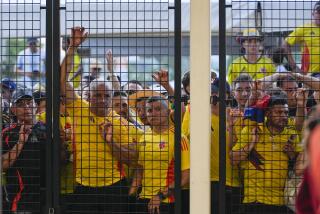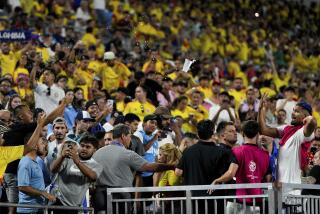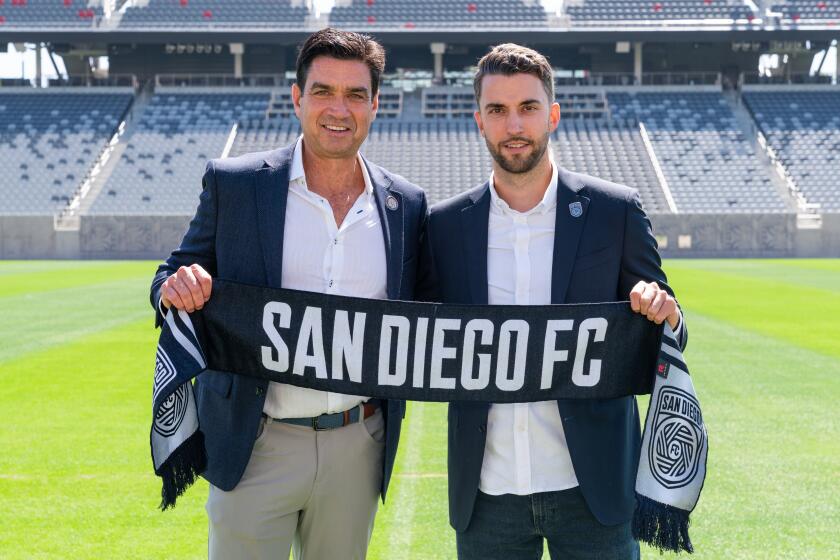U.S. Protesting Shower of Abuse
SAN JOSE, Costa Rica — Remember Roberto Alomar?
Remember how furious umpire John Hirschbeck was and how disgusted sports fans were that Alomar had spat at Hirschbeck during one of baseball’s little controversies?
Now listen to Brad Friedel.
“I’ve never been spat on more times in my life,” the former UCLA goalkeeper said Sunday after Costa Rica had defeated the United States, 2-1, in a World Cup ’98 qualifying game.
It was a comment echoed by all the U.S. players, who had to contend with not only a very talented Costa Rican team but an unruly crowd of 25,000 that was intent upon intimidating the Americans.
The goals by Paulo Wanchope in the 40th minute, Wilmer Lopez in the 84th and, for the U.S., Cobi Jones in the 90th were not the story. The crowd behavior was.
A moat and a barbed wire fence separates the fans from the field at San Jose’s ramshackle Ricardo Saprissa Stadium. But while the fans cannot physically reach the field, there is nothing to stop them bombarding it with every imaginable and unspeakable object.
On Sunday, the U.S. players and coaches were the target of coins, batteries, screws and nails, wire, broken glass, mace and liquids of all kinds--soft drinks, beer and worse.
“It was everything. I don’t know if urine was one of them, I can only hope not,” Friedel said.
“It was,” said forward Eric Wynalda. “I looked up and saw this guy with a cup. I saw it coming but there was nothing I could do. Another guy threw this piece of wire that almost stuck in my leg. I was even spat at in the tunnel [coming onto the field].”
Defender Alexi Lalas was hit on the head by a battery. Even Coach Steve Sampson was spat on twice as he left the field.
The U.S. players and coaches have been around long enough to know that with a World Cup berth at stake, soccer crowds are a factor to be dealt with, especially in Central and South America. Being pelted with debris is nothing new. The spitting, however, is.
“I’ve had plenty of stuff thrown at me, but I’ll tell you what, I have never been looked at in the eye and spat on in the face before,” Friedel said.
Sampson was angered not so much by the result, which leaves the teams tied for first place in their qualifying group, but by the lack of security at the stadium and the unwillingness of Jamaican referee Peter Prendergast to intervene. He said a protest had been filed.
“As much experience as our players have, I don’t think you ever get prepared for batteries being thrown and hitting you in the head,” Sampson said. “Coins being thrown. Mace being sprayed on a player’s back, which was done to Paul Caligiuri. Spitting as you walk in and out of the dressing rooms. These are things that only so much experience can allow you to withstand.
“That didn’t impact, necessarily, the result of the game. But these are definitely things that have to be dealt with and stopped. We’ve already protested to the FIFA commissioner, Jim Fleming from Canada, who will make his report to FIFA. We hope that something will be done for the future.
“There definitely has to be much greater security. . . .They provided it right at the beginning of the game but as the game went on the security became more lax and even after the game it was abysmal, to the extent that we were getting things thrown at us and spat on.
“It didn’t surprise me, but the extent to which we saw it was much greater than we’ve ever experienced before. Typically, countries like El Salvador and Honduras have that kind of situation.”
After the final whistle, Lalas, pointing his finger and yelling, had to be physically restrained from going after a Costa Rican player.
“The finger-pointing by Lalas all started with the disrespect that the Costa Rican [bench] players showed during the playing of the [American] national anthem,” Sampson said. “That carried onto the field and I think Alexi was mature enough not to let it bother him during the 90 minutes of play, but then became frustrated at the end of the match.
“I am so pleased with the level of discipline that my team showed today, given everything that took place.”
Added Sampson: “I hope some day that these kinds of things can be eliminated in CONCACAF, but [meanwhile] we have to learn to deal with it. It’s part of playing internationally. It’s part of playing in World Cup qualifying.”







